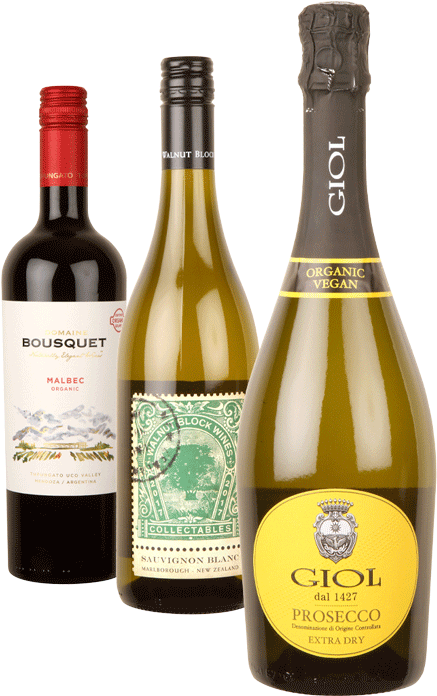Helping the Environment
What We Are
Vintage Roots Ltd was established to supply and promote the benefits of its organic wines and other organic drinks ranges. From Day 1 (1986) this Berkshire-based operation has only worked with wines that meet and exceed its firm and uncompromising standards, for wines of the highest authentic quality, produced and nurtured by low impact producers who proactively work towards sustaining and enriching their local environments.
Clearly we recognise that the running of any business will have some adverse impacts on the wider planet and that it’s our responsibility to manage our environmental footprint. Our ongoing success means that we are currently responsible for maintaining an office, a warehouse and fifteen or so staff. We run a small fleet of four delivery vehicles, a hard-working couple of forklifts and a fair wadge of packaging.
Our ongoing quest to source the best available wines entails a fair amount of travel throughout the UK and further afield. We take our responsibility to source and import the very finest organic offerings from around the world very seriously indeed!
What We Do
- Trade solely with certified organic suppliers that mirror our wider environmental aspirations through their products, goods & services.
- Buy in cardboard box packaging to our own specification, to ensure you receive your drinks in one piece! Cardboard content is at least 75% from recycled material and the rest from FSC certified wood sources. The packaging is fully recyclable also. Our pulp packaging where used is also compostable.
- Strive to be carbon neutral by reducing our carbon use as much as we can, coupled with buying in all our electricity via Good Energy, a 100% renewable energy supplier.
- Minimise our carbon footprint wherever possible and offset the rest by working with Climate Care to calculate emissions and paying for worthwhile offset projects.
- Evolve and develop our range of fair trade organic wines and beverages.
- Wherever feasible we align with other like-minded, ethical and green suppliers for all our business needs (from recycling to ‘boiling the kettle’).
- Offset carbon emissions against all our wine imports worldwide via accredited schemes; especially those that lean towards developing countries.
- Raise internal awareness of environmental issues among our team, guiding and encouraging them to embrace ‘best practices’.
- Deploy sound waste management practices, including compliance with the requirements of the Producer Responsibility Obligations (Packaging Waste) regulations. We stubbornly insist that all cardboard, paper, and glass is segregated and dispatched for recycling.
- Use Greenhouse Graphics for all our print and fulfillment services, thereby championing sustainable printing. There are only a handful of such print centres in the UK that are EMAS accredited. This internationally recognised accreditation is widely seen as the ultimate environmental accreditation for environmentally conscientious businesses and organisations
- Regularly review, re-evaluate and improve our environmental status.
What We Want
- To sell more organic wine!
- Upgrade our vans and investigate the Biodiesel opportunity
- Save electricity: use the review services of Eco-Act or an independent environmental auditor.
- Increase and improve on our 84% recycling rates.
Carbon Impact
In our market sector, we’ve recently heard increasing talk and concern over ‘wine miles’ – i.e. how far a wine travels from producer to consumer and its associated affect on the environment. Though this is hugely relevant for unnecessary foods that get flown in from around the world, we have often considered that the impact for wine (which always travels by either road or sea) could not be a simple case of distance comparison. Hence a few months ago ‘Vintage Roots’ commissioned a study to reveal the true carbon footprint of all its wine imports, using a specialist leading carbon company called Eco-Act. The results were very interesting and show that a longer distance travelled by ship is not as damaging as lots of shorter trips by lorry or truck. Buying a bottle of wine shipped from Australia or South Africa, for example, can carry a lesser carbon footprint than for a wine driven from Southern Italy by truck.
For example, a longer distance trip by ship isn’t as environmentally damaging as a number of shorter truck or lorry journeys. In other words, a bottle of South African wine could have a lower carbon footprint than an equivalent bottle sourced from Southern Italy.
Carbon Offset
In our field we hear a lot about ‘wine miles,’ namely how far a wine travels from producer to consumer and its associated impact on the wider environment. Whilst such a comparison is hugely relevant for unnecessary nicety foods that get flown around the globe, when it comes to wine (which travels by road or sea) we thought a simple distance comparison was insufficient. We commissioned Eco-Act to dig around on our behalf and discovered some interesting travel nuggets.
For example, a longer distance trip by ship isn’t as environmentally damaging as a number of shorter truck or lorry journeys. In other words, a bottle of South African wine could have a lower carbon footprint than an equivalent bottle sourced from Southern Italy.
Carbon offsetting is a way of compensating for the emissions produced with an equivalent carbon saving. Naturally, we only offset those elements we can’t actively control or aren’t able yet to reduce whilst actively encouraging our suppliers to follow our lead.
At this point it’s worth highlighting as a rule of thumb wines produced organically carry only half the eco-footprint of their conventionally produced peers. Carbon offsetting involves calculating emissions and then purchasing ‘credits’ from emission reduction projects.
We’d acknowledge that ‘carbon offsetting’ isn’t a silver bullet for climate change, however it does provide a worthwhile benchmark by which socially responsible businesses like ours can be judged whilst at the same time fostering healthy debate.
The offset funds raised go towards a number of ethical local projects (not only tree planting), that encourage investment in clean technology, reducing emissions and improving lives. We took the decision ten years ago to offset all our wine imports (including UK to UK) and to the best of our knowledge became the first UK wine company to back to such an initiative long-term.
The Cakit Hydro Power Project – Turkey
A previous example of where our carbon offset funds have gone is this
A run-of-the-river hydro power project which reduces emissions by displacing traditional fossil fuel electricity with renewable energy from flowing water.
If that wasn’t enough, the project has created 13 jobs, champions an environmental awareness campaign in the surrounding local schools and encourages meaningful reforestation.
It fills us with pride that Cakit is the first Turkish project and hydropower initiative to acquire Social Carbon certification
It’s a Catchy Phase but what does ‘Vine to Lips’ Mean?
When we say Carbon Offset – “Vine to Lips” we’re referring to the journey of the wine from the vineyard, (once bottled) all the way to our distribution warehouse in the UK. The term doesn’t relate to the wine itself, or each individual ‘jaunt’ a bottle may take around the UK, or elsewhere, before you, our customer decides to drink and enjoy it. Unfortunately we could never be that accurate.
This said, what we are doing feels like a very worthwhile step in the right direction!
Vintage Roots – Carbon Offset Proposal
Eco-Act proposal for Vintage Roots. Emissions offset estimates based on data provided by Vintage Roots relating to importation of a case of 12 bottles of wine. NB – These estimates were completed some years ago and are now only for illustrative purposes. The way emissions are calculated is always evolving.
How its worked out
Working with Eco-Act, we have calculated the distances that our wines have to travel, and have used published emissions calculation numbers to show the carbon footprint of each journey. Some transportation methods are more efficient than others. For example, moving one tonne of cargo by large ship results in 8 times less carbon emissions than moving a tonne by truck. *
From Carbon Clear
Eco-Act are proud to be helping Vintage Roots to continue their track record of excellent environmental performance. They are taking reduction of their internal emissions seriously, and are offsetting the unavoidable emissions by sourcing offset credits from developing countries. This adds to their long-term commitment to working with wine makers who are stewards of their local environment.
-Mark Chadwick, CEO, Eco-Act Limited



